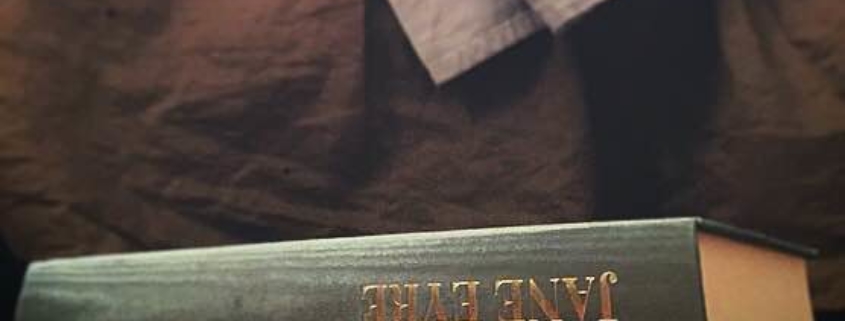Seeing Myself in Jane
There was no possibility of picking up Jane Eyre from my nightstand. Instead I rolled and writhed, wiping my tears with the sheets after the used, crumpled tissues disappeared under pillows from the restless tossing. Each page of the story found a new way to open me up raw, to twist the knife. Continuing was out of the question.
But I had an essay due. When I mustered the strength—or when my self-pity had been exhausted—I thumbed for the last dog-eared page, peering through bleary vision at the passage:
Gentle reader, may you never feel what I then felt! May your eyes never shed such stormy, scalding, heart-wrung tears as poured from mine. May you never appeal to Heaven in prayers so hopeless and so agonised as in that hour left my lips: for never may you, like me, dread to be the instrument of evil to what you wholly love.
I slammed the book shut, and dropped it off the side of the bed. Hairs stood on the back of my neck, prickling with anxiety. Either the story was mirroring my life, or I was going insane. Was I living Jane’s story? Or was I like Bertha, the mad woman in the attic?
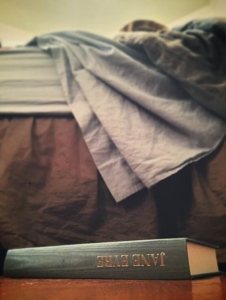
* * *
When I was 21 my boyfriend of four years and I were attending UC Riverside, where he was a history major and I studied English. We carpooled our junior year and spent hours on the road to and from class in heated philosophical discussion, or passionate debate—hands locked on the center console, eyes bright with inspiration. Our teenage tryst turned into a marriage of the minds through our desire to learn from and inform each other; I thought we’d be happy forever in our pursuit of knowledge. We’d each found a soul mate in the other.
But reader, there was someone else. I fell for his puzzling, dark stare across the dining room, the conscious brush of his hand against my ass in the kitchen, or the post-shift fantasies expressed via text message. The bartender at my work was persistent, and I was in love. One late summer night I went to his house for a party, and at the end, we were alone together. What little ability we had left to resist melted like the ice in our unfinished gin and tonics.
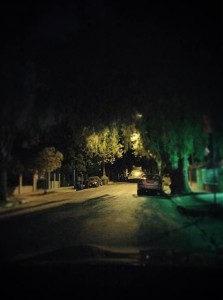 I had no choice. A few nights later, the night before the first day of our senior year, I sat with my boyfriend in his parked car and told him I wanted a break.
I had no choice. A few nights later, the night before the first day of our senior year, I sat with my boyfriend in his parked car and told him I wanted a break.
“I just need time to figure things out. I need to figure myself out.” I didn’t mention the bartender.
After the thousandth utterance, he understood that the conversation was over; he couldn’t change my mind. He sat stiff in his seat, gripping the wheel with both hands; I looked straight ahead, avoiding the sight of the bags under his eyes. He was grappling with the loss like I was, seeing the dream of our futures together scatter like a kicked pile of leaves. Losing the only love we’d known, our hearts broke together. Hurting him was the last thing I’d ever wanted. What had I done?
“We can still carpool tomorrow, if you’d like.”
* * *
On the first day of class I walked in with puffy eyes and a yellow pad of paper in place of my laptop, which I’d forgotten in the blur of an emotional hangover. Typically I approached the front row like it was Christmas morning; this day, I sat off to the side and sunk into the baggy sweater I’d layered myself in, longing to disappear.
The course was titled “Seeing Yourself in Victorian Literature,” and I avoided the gaze of the instructor, Summer Star, as she apologized for the “sparks that would shoot from her eyes” when teaching us her “secular bible”: Jane Eyre. Summer glowed. My face flushed as I half-heartedly scribbled notes from the introductory lecture:
“Meanings of reflexivity”
“New models of self-consciousness”
“Know thyself- a tradition”
The last thing I wanted to do was look at myself. A liar, and a cheater. I’d nearly split myself in two by loving two people at once. What was in my heart, at the very center? A rotten core. Know myself? Pass. Hard pass.
* * *
Starting Jane Eyre without my ex in bed with me, with his nose also in a book, was impossible. My attention drifted from the page to the unfinished gin and tonics, the chill of cold sheets next to me—the mess I’d made. Reading required the ceaseless reigning in of my thoughts.
Until I was wooed by Jane’s narrative. The Bildungsroman pulled me in, right beside her. She was familiar, like a childhood friend. The words startled me as I turned my back to the empty side of my bed:
Reader, though I look comfortably accommodated, I am not very tranquil in my mind . . . It is a very strange sensation to inexperienced youth to feel itself quite alone in the world, cut adrift from every connection . . .
As though I’d turned a corner to see a mirror where I’d expected a wall. Could I have described my state better at that moment? I read on.
. . . all [his] energy, decision, will . . . were full of . . . an influence that quite mastered me,– that took my feelings from my own power and fettered them in his. I had not intended to love him; the reader knows I had wrought hard to extirpate from my soul the germs of love there detected.
Had she known the bartender?
Human beings never enjoy complete happiness in this world. I was not born for a different destiny to the rest of my species: to imagine such a lot befalling me is a fairy tale—a day dream.
Then I read the passage, “Gentle reader, may you never feel what I then felt!”
Books had resonated with me before, but I’d never experienced such a strong parallel. Each address to the “reader” called to me as though it were my own name. She knew the harsh winds, the burn of my cries. Had she heard my prayers? The words were mine, though it was my first time seeing them. My dreams were dashed by the mad woman: myself. I had fallen for, and left Rochester.
I scoured through the rest of the novel as though uncovering Jane’s fate would reveal my own, as if it held an answer—the answer—to my troubles. Was it coincidence that the story fell into my hands at that time? Fate, that our narratives aligned? Was Jane, Charlotte speaking to me?
I researched the topic for my essay.
* * *
I sat under the bright glow of florescent grids hanging overhead, a sacred hush filling the third floor of the library, and read. Dug. The stack of texts I’d gathered reached two feet high, and it dwindled down over the hours like candy empties from a gumball machine. Among the collections of essays I dogeared or annotated with a feverish punch to the keyboard was the holy grail of my quest, titled Dear Reader: The Conscripted Audience in Nineteeth-Century British Fiction.
It told me the intimacy was intentional in Charlotte’s work (and Emily’s, and over a dozen other Victorian authors). The narrator Jane appeals to us in her most isolated, vulnerable moments because she desperately wants us to see that despite her actions and choices, she is a good, and worthy person. Further, she wants us to see that despite our actions and choices, we are good and worthy people. If readers can understand and accept her, then she can accept herself. And if we can accept her, then we can accept ourselves too.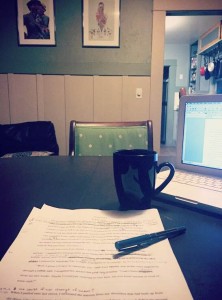
The connection I felt was what Jane intended me to feel. The book, once painful to lift to my tired, wet eyes transformed into a mirror in my hands. A companion in my bed. By spurring emotions in me that I’d only felt in isolation, that I couldn’t put into words myself, she offered this truth: we are not alone.
When I finished Jane Eyre, I saw myself clearly for the first time in months. Not the cheater or the mad woman in the attic, but a person—creature, thing—who was confused. Hurting because I’d hurt someone, like Jane. Like everyone. Her voice called out to me like a supernatural whisper, a hill-sent echo; I’d found my soul mate.
“In spirit, I believe we must have met . . .
perhaps your soul wandered from its cell to comfort mine.”
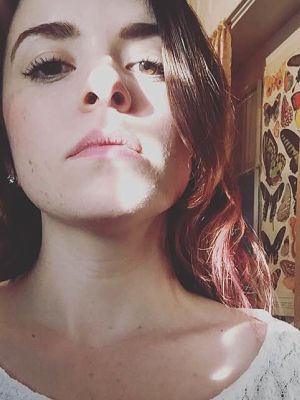 Katy Avila lives in Los Angeles, CA where she is an MFA candidate in fiction at Antioch University. Her obsession with Victorian literature and culture, and interest in medical humanities have inspired her to look closely at the relationship between body and story, and how narratives portray diverse, modern experiences.
Katy Avila lives in Los Angeles, CA where she is an MFA candidate in fiction at Antioch University. Her obsession with Victorian literature and culture, and interest in medical humanities have inspired her to look closely at the relationship between body and story, and how narratives portray diverse, modern experiences.

